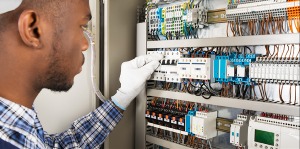
In electrical work, there are so many career paths. These include industrial, residential, commercial electrician and others.
But in this article, we shall focus on commercial electrical trade.
Who is a commercial electrician?
A commercial electrician is a trained and certified person who offers electrical services in commercial buildings.
Unlike residential electricians that work in living houses, commercial electricians work in bigger areas like government buildings, shopping malls, restaurants, and estates.
They can design, draw, and interpret electrical drawings specific to the workplace need and also use the conduit wiring method as required by the national electrical code.
Commercial electricians work with hand and power tools.
What Do Commercial Electricians Do?
Commercial electricians install, repair, maintain, and inspect electrical systems in commercial houses.
A commercial house is a business house that is not for living.
Their work also includes:
- To wire and install electrical components like sockets, circuit breakers and switches.
- Check electrical systems to make sure they are standard as required by the National Electric Code (NEC)
- Troubleshooting and maintenance of an electrical wiring system
- Read and use electrical drawing
- Drawing electrical plans for new buildings
- Lead a team of engineers and also train apprentices.
How to become a commercial electrician
To become a commercial electrician, you need both theory and practical experience. Some go to electrical school to gain the skills needed via an apprenticeship program.
The program takes about four to five years to complete and requires a high school diploma qualification or its equivalent.
Trade unions and contractor associations also fund these electrician apprenticeship programs. During the job-training, apprentices learn how to use electrical tools to perform different tasks on the job.
In class, they learn electrical theories, blueprint reading, first aid treatment, and safety regulations. After the apprenticeship program, the aspiring commercial electrician becomes a journeyman electrician.
Becoming an electrician in most countries requires a license which you can get in your state agency. However, it requires a minimum of five years of work experience under the supervision of a licensed journeyman.
You must also pass all the written tests that cover electrical codes to become a licensed electrician.
How much does a commercial electrician make in a year?
The salary for a commercial electrician is like other electricians. According to the recent salary survey by the U.S. Bureau of Labor Statistics, the average salary of all electricians was $54,110.
The best-paid electricians make over $92000 per year, and greater earnings await you if you have the experience.
Difference between a commercial and residential electrician
Though the commercial and residential electricians have some things in common, they are still different from each other.
Below are some of their differences:
Work site
Commercial and residential electricians work in different environments.
A commercial electrician works on construction sites of commercial buildings such as estates, retail stores, office buildings and other commercial places.
They offer services such as complete installation of an electrical system, troubleshooting/repairs, and other services.
Meanwhile, a residential electrician works in living homes to install wiring systems and electrical components in the new apartment.
They also do electrical work in homes that have families living in them. For this reason, they must learn to respect the homeowner and his properties while they do the installation or repair.
Different job responsibilities
Since they work on different sites, they also have different responsibilities. Example:
- They work on different wiring systems: Commercial electrical work in large commercial spaces with tube conduits while the residential electricians work on smaller wiring systems with plastic sheathing.
- They work on different voltages: A residential electrician works on a high voltage system between 120 and 240 volts, while a commercial electrician can work even on a higher voltage system above 240 volts that supplies electrical power to the site.
Conclusion
Both residential and commercial electricians need basic knowledge of the electrical profession. However, their specialties differ.
While a residential electrician wires, troubleshoots and maintains a living house, a commercial electrician renders electrical service on commercial buildings.
Knowing the difference between the two trades can help you make your choice of profession
Need to hire a commercial electrician for electrical installation and repairs? Contact us at mariaelectricals.com as we are always here for you.
Related articles
Electrical Safety: What You Need To Know Before Working On Your Home’s Wiring